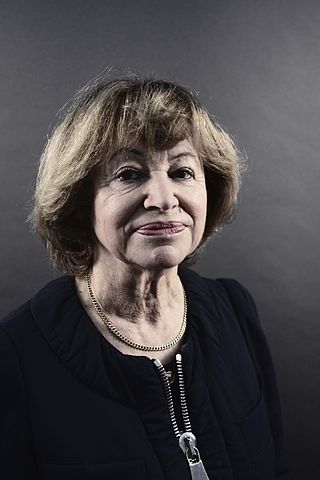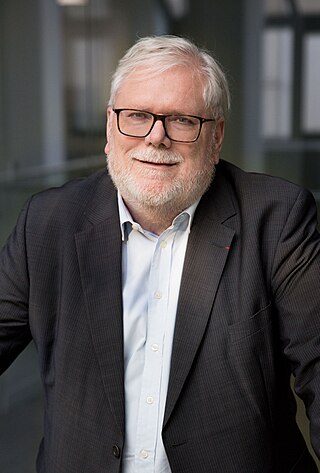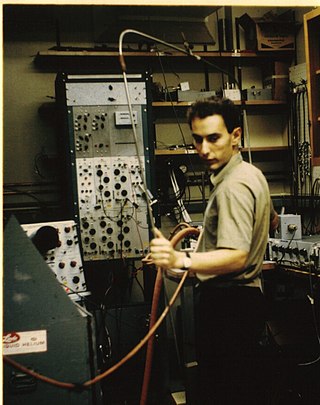Related Research Articles

Urbain Jean Joseph Le Verrier FRS (FOR) HFRSE was a French astronomer and mathematician who specialized in celestial mechanics and is best known for predicting the existence and position of Neptune using only mathematics. The calculations were made to explain discrepancies with Uranus's orbit and the laws of Kepler and Newton. Le Verrier sent the coordinates to Johann Gottfried Galle in Berlin, asking him to verify. Galle found Neptune in the same night he received Le Verrier's letter, within 1° of the predicted position. The discovery of Neptune is widely regarded as a dramatic validation of celestial mechanics, and is one of the most remarkable moments of 19th-century science.

The Paris Observatory, a research institution of the Paris Sciences et Lettres University, is the foremost astronomical observatory of France, and one of the largest astronomical centers in the world. Its historic building is on the Left Bank of the Seine in central Paris, but most of the staff work on a satellite campus in Meudon, a suburb southwest of Paris.
The Institut de Physique du Globe de Paris- Université de Paris is a French governmental, non-profit research and higher education establishment located in Paris, dedicated to the study of earth and planetary sciences by combining observations, laboratory analysis and construction of conceptual analogical and numerical models.

Catherine Jeanne Cesarsky is an Argentine and French astronomer, known for her successful research activities in several central areas of modern astrophysics. She was formerly president of the International Astronomical Union (2006-2009) and the director general of the European Southern Observatory (1999–2007). In 2017 she became Chairman of the Board of the Square Kilometre Array radio telescope project.

Helene Glykatzi-Ahrweiler FBA is a Greek-French academic Byzantinologist. She is also a UNICEF Goodwill Ambassador for Greece. In the 2008 show Great Greeks, she was named amongst the 100 greatest Greeks of all time.

Jean-Claude Pecker was a French astronomer, astrophysicist and author, member of the French Academy of Sciences and director of the Nice Observatory. He served as the secretary-general of the International Astronomical Union from 1964 to 1967. Pecker was the President of the Société astronomique de France (SAF), the French amateur astronomical society, from 1973–1976. He was awarded the Prix Jules Janssen by the French Astronomical Society in 1967. A minor planet is named after him. Pecker was a vocal opponent of astrology and pseudo-science and was the president of the Association française pour l'information scientifique (AFIS), a skeptical organisation which promotes scientific enquiry in the face of quackery and obscurantism.

Françoise Combes is a French astrophysicist at the Paris Observatory and a professor at the Collège de France where she has been the chair of Galaxies and cosmology since 2014.

Stavros Katsanevas was a Greek-French astrophysicist who was director of the European Gravitational Observatory, professor at the Université Paris Cité, former director of the AstroParticle and Cosmology (APC) laboratory and former chairman of the Astroparticle Physics European Consortium (APPEC). In 2000, he received for his work on supersymmetry the Physics Prize from the Academy of Athens. In 2011, he was awarded the Ordre National du Merite. He was an ordinary member of Academy of Europe, Earth and Cosmic Sciences since 2019.

Jean Coulomb was a French geophysicist and mathematician, and one of the early members of the Bourbaki group of mathematicians.

Alain Fuchs is a Swiss-born French Doctor of Science and chemistry Professor, specialized in molecular simulation. He served as the president of Chimie ParisTech - PSL from 2006 to 2010. He has served as the president of the French National Centre for Scientific Research from 2010 to 2017.' He became an Officer of the Legion of Honour in 2014.

Athena Coustenis is an astrophysicist specializing in planetology. Dr. Coustenis, a French national, is director of research, Centre national de la recherche scientifique, at LESIA, at the Paris Observatory, Meudon. She is involved in several space mission projects for the European Space Agency (ESA) and for NASA. Her focus is on gas giant planets Saturn, Jupiter and their moons, and she is considered a foremost expert on Saturn's moon Titan.

Marie Claire Odile Villeval is a French economist and research professor in economics at the National Center for Scientific Research.
Anne-Marie Lagrange, born March 12, 1962 in the Rhône-Alpes region of France, is a French astrophysicist. Lagrange's work focuses on the research and study of extrasolar planetary systems. Lagrange is the holder of numerous scientific awards and honorary decorations, including Knight of the Legion of Honour and is a member of the French Academy of Sciences since 2013.
Mioara Mandea is Head "Science Coordination" Department, Strategy Directorate at the Centre National d'Etudes Spatiales. She won the 2018 European Geosciences Union Petrus Peregrinus Medal and has previously served as their General Secretary. She is Officer, National Order of Merit (2023). She is best known for her work on geomagnetic jerks, sub-decadal changes in the Earth's magnetic field.

Denis Jerome is a French experimental physicist in the field of condensed matter, who contributed to the discovery of superconductivity in organic conductive matter.
Pierre Encrenaz, born on 14 September 1945 in Annecy, is a professor at the Université Pierre-et-Marie-Curie and was head of the École doctorale d'Astronomie et d'Astrophysique d'Île-de-France.
Marie-Lise Chanin, is a French geophysicist, aeronomist, director of research emerita at the French National Centre for Scientific Research (CNRS), and author of works on the physics of the upper and middle atmosphere.
Christine Joblin is a French astrochemist who uses spectroscopy to study photodissociation and the polycyclic aromatic hydrocarbons in cosmic dust. Beyond her experimental and observational work, she also contributed to the first clear finding of buckminsterfullerene in a meteorite, a ureilite that exploded over the Nubian Desert in late 2008. She is a director of research for the French National Centre for Scientific Research (CNRS), affiliated with the Institut de Recherche en Astrophysique et Planétologie in Toulouse.
Jean Delhaye (1921–2001) was a French astronomer and director of astronomical research at several institutes.
Thérèse Encrenaz is a French planetary scientist who "played a leading role in the development of planetology in Europe". Her research concerns extraterrestrial atmospheres, particularly of the planets and comets in the Solar System. She is a research director for the CNRS, emeritus, affiliated with the Paris Observatory.
References
- 1 2 Fabienne Casoli elected President of the Paris Observatory-PSL (PDF), Paris Observatory, 30 January 2020, retrieved 2023-08-07
- ↑ "Fabienne Casoli", Theses.fr, retrieved 2023-08-07
- ↑ "Décret du 2 juin 2023 portant promotion et nomination dans l'ordre national du Mérite", Journal officiel, 3 June 2023, retrieved 2023-08-07
- ↑ McClintock, Peter V.E. (November 2010), "Review of Planetary Systems", Contemporary Physics, 51 (6): 561–562, doi:10.1080/00107514.2010.496573